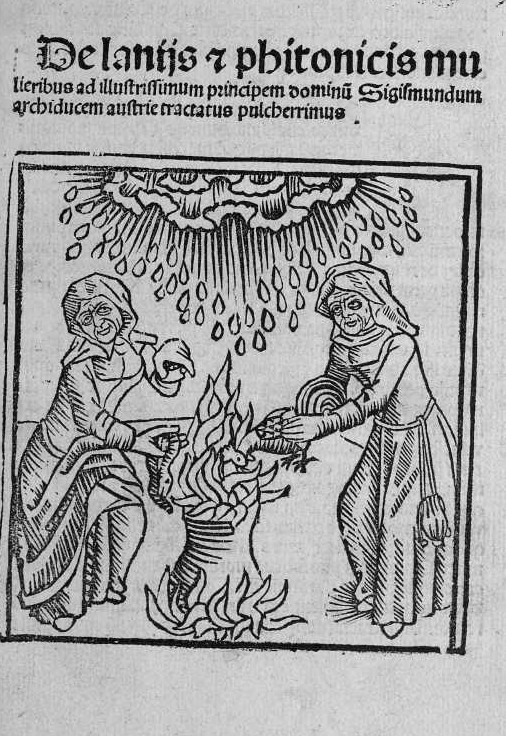Ulrich Molitor on:
[Wikipedia]
[Google]
[Amazon]
 Ulrich Molitor (also Molitoris) (c. 1442 – before 23 December 1507) was a lawyer who wrote a treatise in opposition to the recent witch-phobic efforts by
Ulrich Molitor (also Molitoris) (c. 1442 – before 23 December 1507) was a lawyer who wrote a treatise in opposition to the recent witch-phobic efforts by
Ammann, Hartmann, ''Der Innsbrucker Hexenprozess von 1485'', in: Ferdinandeum Zeitschrift III. Folge, 34. Heft, S. 31 ff.
* Beyer, Jürgen, 'Molitor, Ulrich', in ''Enzyklopädie des Märchens. Handwörterbuch zur historischen und vergleichenden Erzählforschun'', vol. 9 (Berlin & New York, 1997–99), col. 767-769 * Mauz, Jörg, ''Ulrich Molitoris. Ein süddeutscher Humanist und Rechtsgelehrter'' (Vienna, 1992) *Geiling, Jens and Gawron, Thomas: "Molitor, Ulrich" in: ''Lexikon zur Geschichte der Hexenverfolgung''
historicum.net
{{DEFAULTSORT:Molitor, Ulrich 1440s births 1507 deaths Critics of witch hunting German male writers Witchcraft in Germany
 Ulrich Molitor (also Molitoris) (c. 1442 – before 23 December 1507) was a lawyer who wrote a treatise in opposition to the recent witch-phobic efforts by
Ulrich Molitor (also Molitoris) (c. 1442 – before 23 December 1507) was a lawyer who wrote a treatise in opposition to the recent witch-phobic efforts by Heinrich Kramer
Heinrich Kramer ( 1430 – 1505, aged 74-75), also known under the Latinized name Henricus Institor, was a German churchman and inquisitor. With his widely distributed book ''Malleus Maleficarum'' (1487), which describes witchcraft and endorses ...
. Molitor's work, ''De Lamiis et Pythonicis Mulieribus'', was first published in 1489, three years after the first edition of Kramer's work, ''Malleus Maleficarum
The ''Malleus Maleficarum'', usually translated as the ''Hammer of Witches'', is the best known treatise on witchcraft. It was written by the German Catholic clergyman Heinrich Kramer (under his Latinized name ''Henricus Institor'') and first ...
'', and both books were reprinted frequently throughout the 1490s. Moliter was likely to have personally witnessed the inquisitions led by Heinrick Kramer in the diocese of Brixen and the diocese of Constance.
Molitor's work is written in the form of a dialogue with Molitor's position that of a skeptic in opposition to a witch-phobic fanatic (likely meant to represent Kramer). A third figure, Archduke Sigismund, acts as a wise arbiter. Molitor's position is that of the ancient and long-held traditional Catholic law, the Canon Episcopi
The title canon ''Episcopi'' (or ''capitulum Episcopi'') is conventionally given to a certain passage found in medieval canon law.
The text possibly originates in an early 10th-century penitential, recorded by Regino of Prüm; it was included ...
(906), that considered witchcraft an illusion. Molitor quotes the Bible, Church Fathers and poets and focusses on the devil's ability to deceive. Sigismund in the dialogue is quick to dismiss evidence that was produced through the use of torture: "For the fear of punishments incites men to say what is contrary to the nature of the facts". Sigismund had also experienced an inquisition led by Kramer in Innsbruck in 1485 and may have played a decisive role in shutting it down, thereby preventing seven accused women from being executed.Christopher Mackay, ''An Unusual Inquisition'', Boston, 2020, p 72 n5. Note, this is an English translation of the documents printed in 1890 by Hartmann Ammann, plus notes, corrections, and seven other related documents. For the message from Sigismund, see Document #6, p 106.
Citations
Editions
* Molitoris, Ulrich, ''Schriften'', ed. Jörg Mauz SJ [Studien zur Kulturgeschichte 1) (Constance, 1997) * Molitor, Ulrich, ''Von Unholden und Hexen'', New edition, annotated and translated into modern German, UBooks 2008Sources
Ammann, Hartmann, ''Der Innsbrucker Hexenprozess von 1485'', in: Ferdinandeum Zeitschrift III. Folge, 34. Heft, S. 31 ff.
* Beyer, Jürgen, 'Molitor, Ulrich', in ''Enzyklopädie des Märchens. Handwörterbuch zur historischen und vergleichenden Erzählforschun'', vol. 9 (Berlin & New York, 1997–99), col. 767-769 * Mauz, Jörg, ''Ulrich Molitoris. Ein süddeutscher Humanist und Rechtsgelehrter'' (Vienna, 1992) *Geiling, Jens and Gawron, Thomas: "Molitor, Ulrich" in: ''Lexikon zur Geschichte der Hexenverfolgung''
historicum.net
{{DEFAULTSORT:Molitor, Ulrich 1440s births 1507 deaths Critics of witch hunting German male writers Witchcraft in Germany